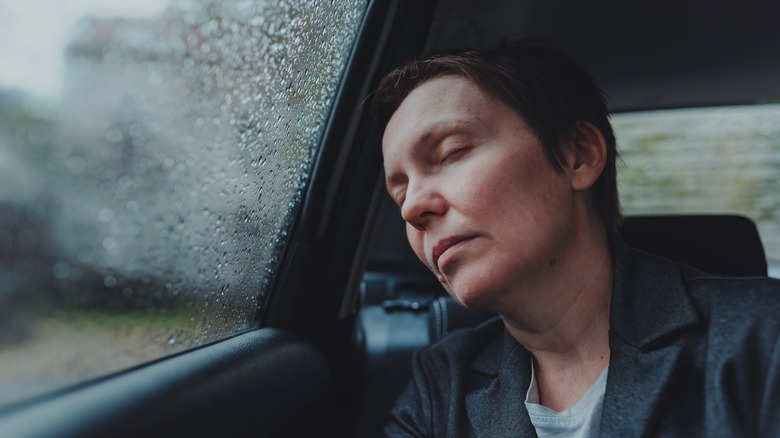Why Does Rain Make You Fall Asleep Faster?
Ever found the pitter-patter of rain to be mesmerizing and meditative? Turns out, you're not alone. Turn on a meditative app and you'll instantly plunge into the repetitive sounds of rain falling in the rainforest. Not only is it calming to listen to it under a cozy blanket, but the white noise starts to feel like a perfect bedtime song. But does rain actually help your sleep?
When it's pouring outside, the rhythmic pink noise pattern of rain pushes the brain to a deep unconscious relaxation state, as per Healthline. Just like that, rain becomes a great natural lullaby to promote sleepiness as it produces alpha waves, typically between 0 to 20 kHz (per the University of Melbourne). However, the health benefits of rain don't stop there.
Oftentimes rainy weather is accompanied by dark clouds or overcast skies. It's believed more instances of dark skies may increase levels of melatonin since this sleep hormone is governed by light and dark (via Action News 5). Thus, the dimmer an environment becomes the more melatonin the brain releases and the sleepier we become (via the University of Melbourne).
Besides, rain also limits outdoor activities and exercises, making sleep a preferred activity of choice. Whether there's nothing to do or boredom creeps in, rain helps facilitate a comfortable sleep space at home.
How else does rain affect the body?
Believe it or not, the air changes when it's raining. According to the University of Melbourne, the air becomes filled with negative ions during rainfall, due to the friction between air and rain. Negative ions are odorless and invisible particulars that hold a negative charge. When these ions come into contact with our bloodstream a powerful biochemical reaction occurs enhancing mood, relieving stress, boosting energy to the brain, and even easing depressive symptoms (via WebMD).
Not only do negative ions improve human health, but one 2018 study found that negative ions also improve air quality and oxygen content. "They also may protect against germs in the air, resulting in decreased irritation due to inhaling various particles that make you sneeze, cough, or have a throat irritation," director of research at the Center for Applied Cognitive Sciences, Pierce J. Howard, tells WebMD. In other words, the negative ion content found in rain may help improve respiratory health and cardiovascular health (via The University of Melbourne). Acting like a calming agent, these ions have a hypnosis-type effect on the body, which may be another explanation as to why you catch better zzz's during a rainstorm.


